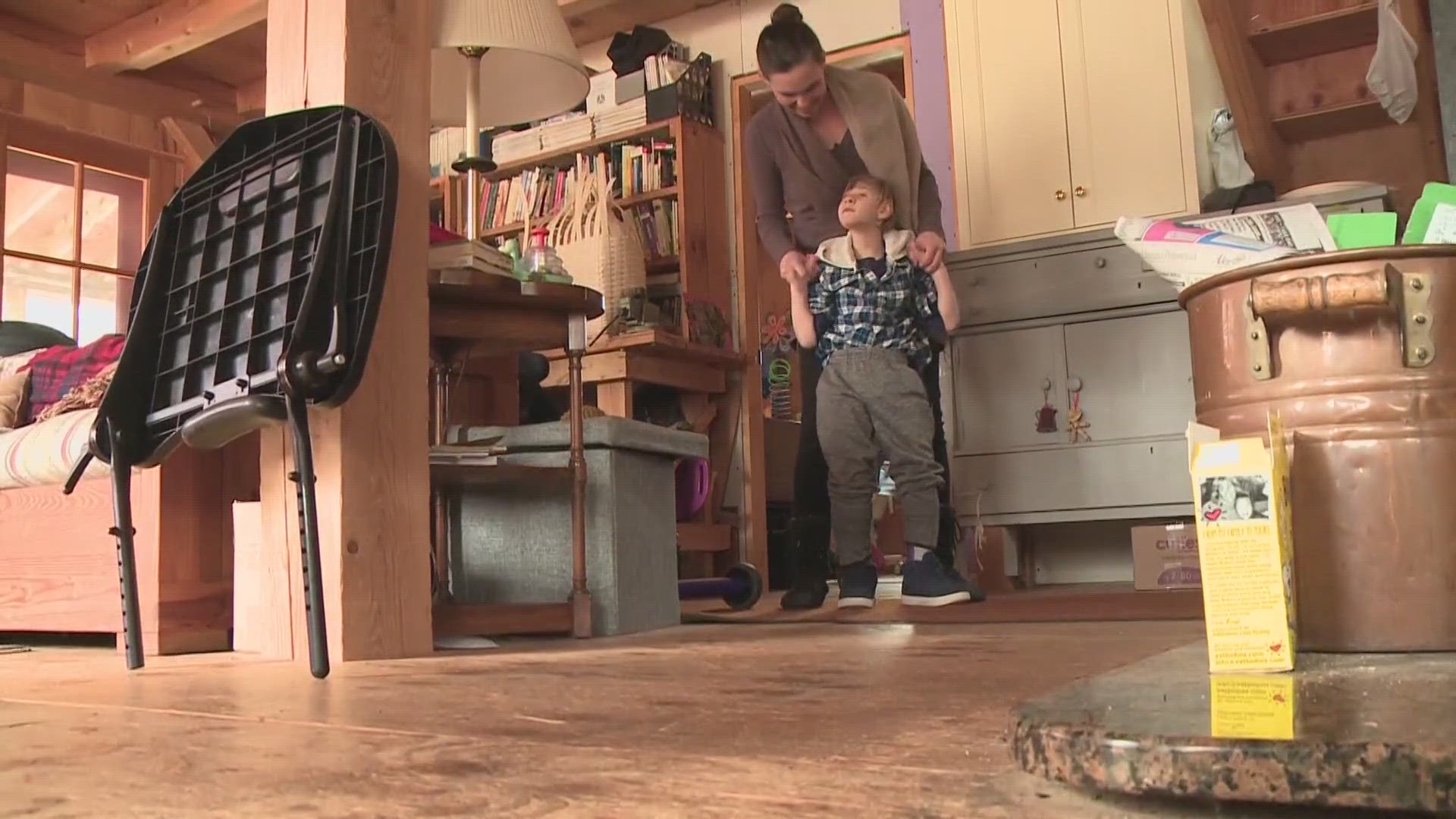BELFAST, Maine — The growing shortage of home health care workers is taking a big toll on one of Maine's most vulnerable populations.
That gap is forcing dozens of families of children with severe medical needs to provide around-the-clock care themselves. But Maine lawmakers are considering a bill this session that would pay parents to care for their children.
Andrea Dole of Belfast recalls the joy of having her firstborn son James at home.
"With two midwives, a doula, and my husband right by my side," Dole said.
But James, who came into this world with a smaller head, had to be rushed to Northern Light Hospital hours later. He was diagnosed with microcephaly, which is caused by a recessive gene disorder.
"The brain had stopped developing at a certain time, so his head stayed small and his body stayed small," Dole explained.
James, who also has a 5-year-old brother, Rafe, has cerebral palsy, a seizure disorder, and other severe delays. James also has a visual impairment and underwent surgery for hip dysplasia last fall. He is nonverbal and has a feeding tube. Now 7 years old, James needs constant medical care and therapy. He also loves to create art and swing in this specially designed swing.
Under MaineCare, the state's version of Medicaid, James qualifies for 120 hours of in-home nursing care per week. But filling those hours has been impossible. More than a dozen home health nurses have left for better-paying jobs. James has one nurse, Richard, who is by his side during school. Andrea's husband Patrick works long hours as a boatbuilder, leaving James's care solely on her shoulders.
"I monitor for seizures. I train all the nurses that come into our home. I give medicines," Dole said.
Andrea recently joined other parents of children with medical and developmental needs testifying in favor of LD 874. Under the proposal, parents who have shown they have actively tried to find home nursing staff could be reimbursed for caring for their children. Parents would also have to become certified caregivers.
Sen. Joe Baldacci, D-Bangor, is a sponsor of the bill. He told members of the legislature's Health and Human Services committee the bill is needed to help address staffing shortages, among other concerns.
"Trying to discourage children from having to be moved out of their homes, trying to help parents who oftentimes have to quit their jobs, and maintain their sanity in their lives," Baldacci testified.
Other states including Colorado have adopted similar programs, where caregivers providing unpaid care for their relative or loved one with special needs may have the opportunity to be reimbursed or paid for some of their time spent caregiving.
But some disability rights advocates say a much bigger problem needs to be fixed.
"These are invisible children that don't have a waitlist to go on," Nancy Cronin, the executive director of the Maine Developmental Disabilities Council, said.
Unlike children with behavioral health care needs, Cronin said there is currently no centralized referral system within Maine's Department of Health and Human Services where case managers can work with families of medically fragile kids, which could number more than 100 across the state, to find professional medical help.
"There is nobody capturing that, and there is nobody sharing that information so these folks can get their needs met," Cronin explained.
Jackie Farwell, the spokeswoman with Maine's DHHS tells News Center in a statement:
"The Department recognizes the challenges that parents of medically fragile young children face in securing care that meets their complex needs. While this legislation conflicts with federal regulations prohibiting Medicaid reimbursement to parents for providing personal care services to their minor children, the Department has taken steps to support the direct care workforce in the interest of these families and many others across the state. This includes Governor Mills' investments through the Maine Jobs and Recovery Plan to support healthcare workforce training, Healthcare Training for ME, a program to expand the availability of free and low-cost career training, and the Caring for ME marketing campaign to educate and encourage residents to become direct care providers," Farwell said.
Andrea, a social worker, doesn't expect to resume her career anytime soon. She said she wants to be compensated for being by her son's side and give this family a chance to survive emotionally and financially.
A work session on LD 874 is scheduled for 2 p.m. Thursday, April 13, in room 209 at the Cross Building in Augusta.
For more information about paid family caregiving for children with complex medical needs and disabilities, you can click here.
For more resources from the National Library of Medicine about family caregivers click here.

